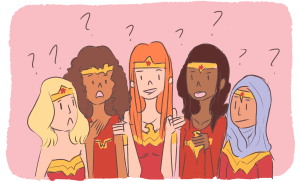
Photo from: SABINE OSMANN-DEYMAN
Beginning the year with studying identity has provided me with some necessary introspection. I consume a variety of media on a day to day basis and thinking more critically about how groups and communities are presented in text is quite intriguing to me. One part of identity that we zoomed in on was representation.
An interesting realization that I came to about representation is that different degrees of representation can impact the influence that the media has as well as stereotypical depictions. Learning about Kate Clanchy and her very stereotypical, offensive representation demonstrated the danger in furthering incomplete and surface level views of certain groups; especially when the writer likely had little knowledge of who she was representing. Clanchy’s mention of offensive stereotypes were brief and yet deeply impactful on her readers. Clanchy as a non-POC was writing about different groups based on mere assumptions instead of doing proper research to understand said communities. The discussion around Clanchy’s acts raised the point of whether writers or creators have any ability to write about communities that they may not identify as being part of.
My personal opinion is that it depends on the amount of research and understanding that the writer puts into knowing the culture they are writing about. Sometimes writers may also just choose to briefly mention that a character belongs to a certain community, but not pass any further judgments about them. The problem really begins when writer focus the character’s arc around personal aspects of their identity when they themselves know little to nothing about the part of identity they are exploring. I think that if a story has main character whose arc is deeply revolved around being Asian-American for example, it is best if an writer who has experienced growing up as Asian-American told that story as they could fully flesh out what they’ve gone through and add personal touches to the tale. But generally, there is little harm in adding in small bits of representation as a person not from the specific group as long as you remain respectful and within your boundaries.
Additionally, text can be a big reflection on a writer’s identity as people tend to write about what they already know. Even in fantastical tales, real life problems and events are usually still represented metaphorically which gives way for writers to still explore their personal experiences.
In conclusion, exploring representation in media is complex and has so many facets to it. I think that representation can be empowering and provide agency to younger generations especially. This is specifically true for young kids who grow up not seeing themselves in a lot of the media that they consume. When you see someone who resembles you accomplishing amazing things or even just going about their day to day lives, you feel validated and included in conversations. As a Filipina teenager, I can say that I try to seek out content with people who look like me because it shows me that I am recognized in society.
But also, I hope that representation of more marginalized groups is never reduced to just small mentions and acting as side characters. I strongly believe in seeing more variety of main characters outside of media standards. I think that a lot of my points in this reflection feed back into each other: if we have more media representation of different groups, more people will feel empowered to tell their own stories and therefore become more likely to accurately represent them allowing for future generations to feel included in conversations that we have together. My writing might sound like a ramble here, but nonetheless, I believe that this topic is very current and crucial to discuss.